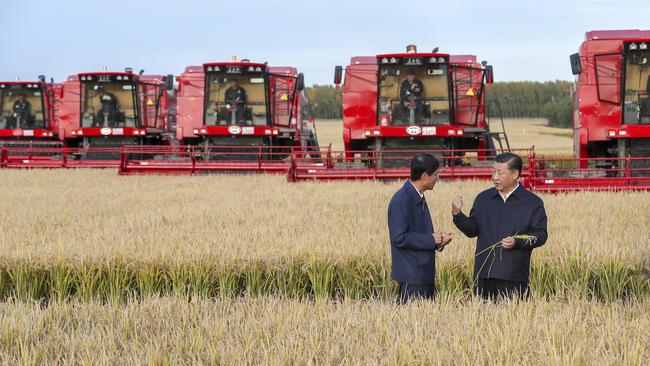Xi Jinping makes hay as US holds ‘knife to throat’ of trade
While Donald Trump has been attacking China at the UN, Xi Jinping has been doing a tour of the country’s northeast.

While Donald Trump has been attacking China at the UN in New York this week, President Xi Jinping has been doing a tour of the country’s northeast, urging Chinese to become more self-reliant.
Xi’s presidential swing through the industrial and agricultural region, with pictures of him talking to farm hands and factory workers, was designed to show a cool-headed leader in touch with his country’s grass roots at a time when it is under a barrage of attacks from the US.
As relations suffered one of their worst weeks yet, with the imposition of US tariffs on $US200 billion worth of Chinese export, Trump declaring his friendship with Xi over and signs of increased military tensions, the Chinese leader has been positioning himself as above the fray, leaving the bitter trade and foreign affairs debate to underlings.
He chose to stay away from the UN General Assembly in New York this week, leaving Foreign Minister Wang Yi to rebut the latest string of accusations from a belligerent Trump that included China allegedly meddling in the US mid-term elections.
In Beijing, six senior trade and commerce department officials fronted a 90-minute briefing on a white paper refuting US allegations that are the basis for its trade war, including the theft of intellectual property.
The officials said China wanted to get back to the negotiating table with the US but could not do so at the moment, as dealing with the Trump administration was trying to talk “with a knife to the throat”.
The white paper accused the US of using bullying tactics and argued that the US and China had benefitted from their increasing trading relationship in China’s 40 years of economic opening up.
Xi’s northeast swing was designed to send a message to reinforce his socialism with Chinese characteristics when China was under attack from “unilateralism and protectionism”.
Touring a state-owned farm and a machinery maker in Heilongjiang province, along the Russian border, Xi talked about the importance of being self-reliant, including in food and manufacturing. “Internationally, it is becoming more and more difficult to obtain advanced technologies and key know-how,” he said.
“Unilateralism and trade protectionism are rising, forcing us to adopt a self-reliant approach.
“This is not a bad thing. Ultimately, China depends on itself for development.”
He said China needed to have control over its own “rice bowl”.
China has been a major importer of soy beans from the US but has been forced to impose tariffs on US imports in retaliation for the new US tariffs, which now cover $US250bn worth of exports.
Xi’s visit to China First Heavy Industries in Qiqihar was chosen because it dates back to the 1950s when China was economically isolated from the rest of the world.
Once the backbone of the Chinese economy, the industrial northeast has suffered from the shift of production to modern and less polluting regions in south and coastal regions.
At a visit later in the week to a state-owned petrochemical factory in Liaoning province, Xi spoke out in favour of China’s state-owned enterprises.
His comments were a reminder that Xi’s approach to China’s economy is still rooted in the state-owned sector. It looks as if the private sector is the one that will be hardest hit by the fallout from the trade war.
Tensions have opened up on the military side, with the US hitting China with sanctions for buying arms from Russia and Chinese anger at the US selling military spare parts to Taiwan. A senior defence official this week argued that Trump was using China to rally voter support for the November mid-term elections. “We will not give in to threats,” Senior Colonel Ren Guoqiang said.
As China moves into its annual Golden Week holidays next week, it will be hoping for some respite from the political attacks from Washington. But as relations get worse, both sides are now bunkering in for a long bitter fight.



